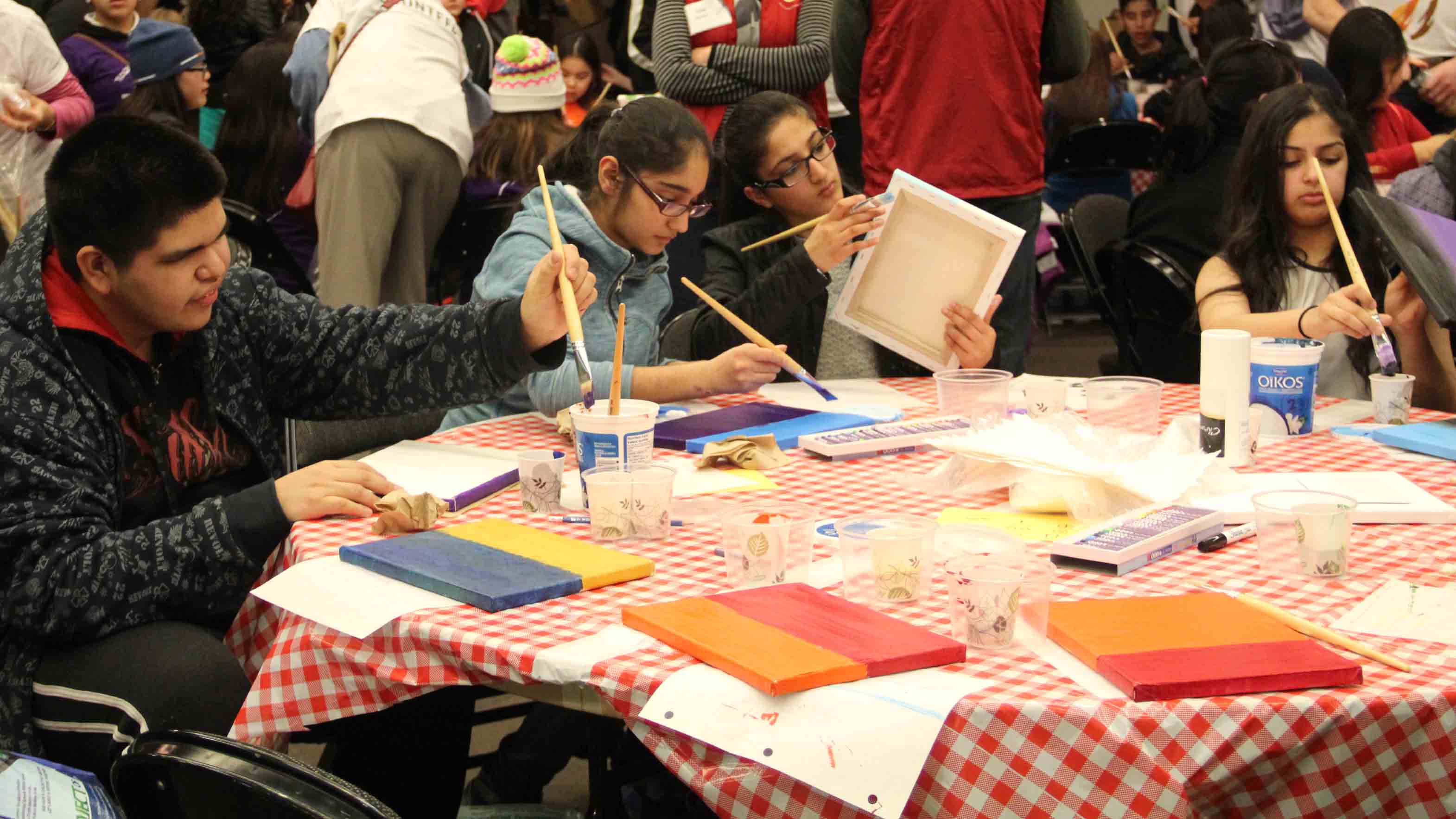(Truth and Reconciliation Commission Chair Murray Sinclair speaks during the opening day of the TRC’s seventh national event in Edmonton. In foreground is the Brentwood Box.)
By Jorge Barrera
APTN National News
EDMONTON–After viewing a black and white photograph of a group of boys from an Indian residential school, Katie Saulteaux split her canvas diagonally, from corner to corner, and painted one side all in red.
Saulteaux, 14, said she used red to signify the worry she felt for the boys in the historical photo.
“All those little boys are going through harm, being traumatized and abused,” she said.
Saulteaux is from Paul First Nation, which sits about 80 kilometres west of Edmonton where the Truth and Reconciliation Commission (TRC) is holding its seventh and final national event.
She was among several dozen students sitting around tables in the basement of the Shaw Conference Centre Thursday trying to translate what they learned into art. The theme of the opening day of the four-day event was, “Fostering Reconciliation Through Education.”
About 2,200 hundred students from across Alberta attended the day’s events which featured panels, throat singing, fiddling, a hip hop performance and other musical acts.
Alberta had the highest number of operating residential schools with 25 and is currently home to about 12,000 residential school survivors.

Eyeing her half-painted canvas, Salteaux said she planned to add blue paint to her artwork.
“It represents sadness about how the boys had been treated,” she said.
Saulteaux said she knew little about residential schools before today. She said she didn’t know why she was never taught about what happened.
“I am kind of disappointed I didn’t know about it before,” she said.
Megan Russell, 16, also said she didn’t know a lot about residential schools. The Grade 10 student from Lloydminster, Alta., said she know felt a responsibility to tell others about what she learned.
“I didn’t know too much about it and it’s really changed my state of mind,” said Russell, who is Gitxsan from British Columbia.
Isadore Alexis-Paul, 13, from Alexis Nakota Sioux First Nation, said the TRC event gave him knowledge he lacked.
“It’s cool actually hearing about this history,” he said. “I find it interesting learning this because I didn’t know….I think it probably will change the way I see things.”
Residential school survivor Satoe, 65, said it didn’t surprise him that children from First Nation communities knew little about such a dark chapter in history.
“Some people don’t want to talk about it because they’re too ashamed,” said Satoe, who is from the Blood Tribe and went to the St. Mary’s residential school for five years beginning in 1955.
Satoe described his time at residential school as “really awful” and most of what he remembered involved forced labour.
“You can’t forgive ever, though people ask for forgiveness,” he said. “I don’t think there will ever be reconciliation.”
TRC Chair Murray Sinclair said that while reconciliation is one of the aims of the commission’s work, it will be up to the youth to finish that task.
“We will not achieve reconciliation within the term of this commission. We will not achieve reconciliation in our lifetime,” said Sinclair.
With one year left in the commission’s mandate, Sinclair said the work will transfer to other hands.
“The obligation of all this work goes back to the people of this country, to you,” said Sinclair. “This is not an Aboriginal problem, it’s a Canadian problem.”
Throughout the over century-long existence of residential schools, 150,000 Indigenous children were processed through about 130 schools. Thousands never made it home and many died from disease or violence.
The TRC was created as a result of a multi-billion dollar, class-action settlement agreement between residential school survivors, Ottawa and the churches which ran the schools.
The TRC has already held national events in Winnipeg, Inuvik, NWT, Halifax, Saskatoon, Montreal and Vancouver.
The TRC will also be holding a closing ceremony in Ottawa.
@JorgeBarrera









